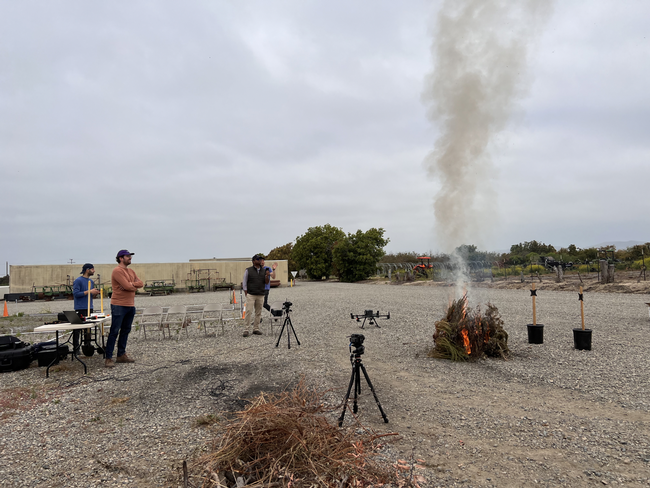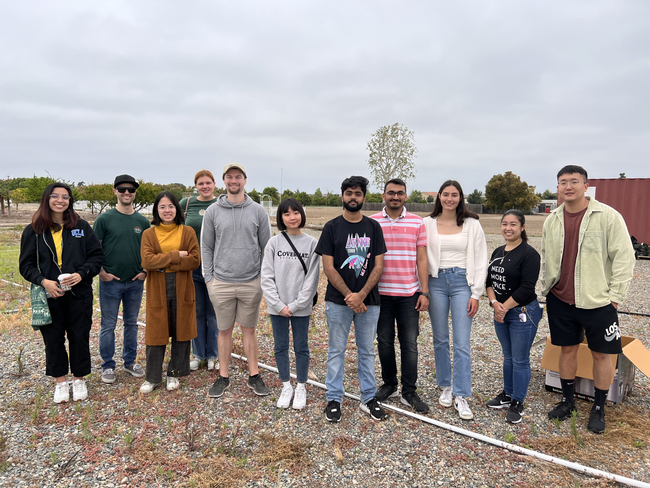- Author: Saoimanu Sope
Besides starting fires for the sake of research, Luca Carmignani, UC Cooperative Extension fire advisor for San Diego, Orange, Los Angeles, and Riverside counties, has started leveraging his connection to local UC campuses by providing opportunities for hands-on learning.
Early one morning in May, students and staff from UC Irvine and UC Riverside gathered at the South Coast Research and Extension Center to collect data for their own research projects. South Coast REC, located in Irvine, is part of a statewide network of research and education facilities operated by UC Agriculture and Natural Resources.
In one area of the field, graduate students picked leaves and twigs from dried shrubs, carefully placing them in a device that measures moisture content. In another area, a postdoctoral scholar set up a device that records levels of particulate matter, carbon dioxide and other air pollutants emitted by a fire.
Tirtha Banerjee, professor in the Department of Civil and Environmental Engineering at UC Irvine, coordinated the field day with Carmignani. The two first connected as members of iFireNet, an international network of networks that connect people to fire research, when Carmignani was a postdoctoral researcher at UC Berkeley.
Now, the two are collaborating to help environmental science and engineering students realize the potential of their research interests.
Jacquelynn Nguyen, a Ph.D. student in the Civil and Environmental Engineering department at UC Irvine, is interested in understanding how ash from wildfires and prescribed burns can be used as a treatment for per- and polyfluorinated substances. PFAS are a group of “forever chemicals” that can be found in heat-resistant materials – including fire extinguisher foam – and are extremely difficult to eliminate.
Before Nguyen could collect her ash samples, Carmignani needed to cautiously set the dried shrubs on fire, providing a realistic situation for data collection purposes.
“We're trying to figure out if the ashes from these fires can be used as activated carbon, which could be used as a treatment for PFAS,” said Nguyen. “We want to see if this treatment can basically absorb PFAS and prevent it from traveling into soil and groundwater.”
While Nguyen is concerned about the impact that wildfires have on the land, Soroush Neyestani, a postdoctoral scholar in the Environmental Sciences department at UC Riverside, is interested in its impact on the air quality.
During a fire, it's difficult to determine how much emissions are a result of flames versus smoldering, the process of burning slowly with smoke but no flames, and current air quality models do not provide accurate guidance on this matter. Using an air quality sensor, Neyestani wants to quantify the difference in emission levels during the two phases.
“There are assumptions that 50% of emissions come from smoldering, but every fire is different. Our main objective is to improve the accuracy of air-quality forecasting,” Neyestani said, noting his concern that these assumptions might not be realistic.
Although the field day was created with the students in mind, Carmignani used the opportunity to polish his own research efforts. Since fall 2022, he has been investigating the flammability of low-water use landscape plants based on various irrigation applications.
“Every time we burn, I feel like we get better. We get better data, and we conduct better analysis, and that's really important for us so that we can figure out how we can apply our research and measure its outcome,” said Carmignani.
In addition to welcoming more collaborations with UC campuses and other organizations, Carmignani is hopeful that these combined research efforts will spark an interest in wildfire awareness everywhere.
- Author: Saoimanu Sope
Before Brent Flory, 22, started bagging fruits and vegetables at his local Stater Bros. Market, he picked them at the University of California South Coast Research and Extension Center in Irvine.
In partnership with Saddleback Unified School District's Esperanza Education Center, an adult transition program that provides independent living and life skills training for students with disabilities, South Coast REC hosts students on its 200 acres of land and introduces them to careers in agriculture.
Flory recalls picking avocados as one of his favorite moments from the program at South Coast, one of nine RECs across California operated by UC Agriculture and Natural Resources. “I picked a huge avocado and got to bring it home. It was the size of a medium pumpkin,” he shared.
Field work doesn't warrant business attire, but Flory said that working at South Coast REC taught him the importance of dressing appropriately for work. In this case, it meant pants, closed-toe shoes, a shirt with sleeves, and sunscreen or a hat if working in the sun.
While program managers hope that participating students would pursue a career in agriculture, South Coast REC is more concerned about providing opportunities for students to gain real work experience in a unique setting. 
“This is the first time I have had the opportunity for my students to work at a job site in the agricultural field. We never really thought of the agricultural industry as an option for our students,” said Esperanza's education specialist, Michael Seyler.
Esperanza's partnership with South Coast REC began in October 2019. Since then, nine participants have been assigned to work at the research center where they help create seedlings, plant and harvest crops, and learn plant management.
Ray Bueche, Adult Transition Program coordinator and Career Start administrator at Esperanza, is proud of the creative energy it took to develop the program and unite partners, crediting Jason Suppes, South Coast REC's community education specialist. “Working with Jason and UC ANR has inspired me to continue to reach for unique partnerships in this field and elsewhere,” Bueche said.
Dylan Shelden, 19, another past participant, said that the program revealed how important it is for him to choose a career that makes him feel happy and independent. “You are responsible for yourself,” he said. “So, don't quit on the first try.”
Shelden currently works at Party City as a store organizer. Even though he prefers working indoors, Shelden described working with plants and being outdoors as refreshing. “Working in agriculture makes me feel good,” he said.
When asked what advice he would give incoming students, Shelden said: “Be kind, mindful, and thoughtful to others.”
“Things are constantly changing at the farm and follow seasonal patterns. Students get to work with different types of produce depending on the season. So many of my students only thought about jobs in retail or food services industries,” said Seyler. “This has opened their eyes to other possibilities.”
The soft skills learned while working at South Coast REC has helped other students secure paid competitive employment during or following the program. It has also inspired program staff like Bueche and Seyler to consider other unique opportunities for their students to connect the skills they have learned on the farm to other types of jobs.
To learn more about the Adult Transition Program at Esperanza Education Center, visit: https://www.svusd.org/schools/alternative-schools/esperanza/about/why-esperanza






